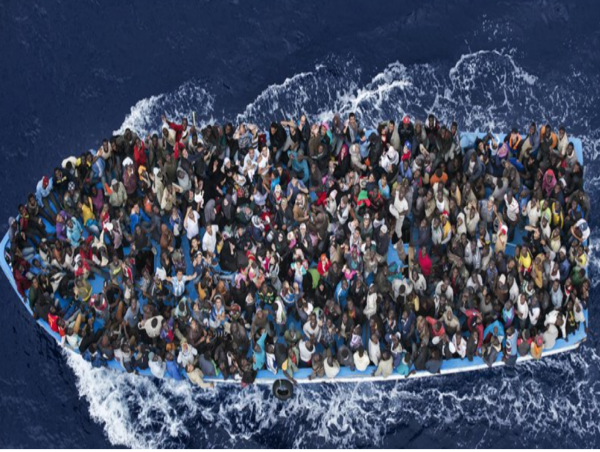Advocates say this ‘weaponization for political gain’ is increasing migrants’ vulnerability to trafficking, exploitation, and even death. The claim to be fighting trafficking is conversely being used to renege on modern slavery protections.
It is a critical moment in global politics with election season underway. And migration has become a hot button topic for politicians and governments at a time when the number of migrant deaths has never been higher.
Joanna Ewart-James, Executive Director of anti-trafficking organization Freedom United, who hosted the online event said:
“As global displacements rise due to economic collapse, conflict, persecution, and climate disasters, opportunities for safe, regular migration routes are closing. People on the move are being forced to take extreme risks in search of a better life, but with no protection or access to safe routes, some face being exploited, detained, and even killed.”
Ewart-James explained that people on the move are not inherently vulnerable to exploitation or human trafficking. Rather, their vulnerability is caused by the wave of anti-migration views, which results in their marginalization, as well as policies that remove protections and safe routes to travel, which greatly increase their vulnerability and, therefore, their exploitability.
Migration experts highlighted the growing trend of governments and politicians, who they say are hijacking “anti-trafficking” narratives to legitimize anti-migration policies that push people towards exploitation.
Trafficking networks have become stronger and more lucrative as migration policies grow tighter and become more restrictive, whilst claiming to disrupt trafficking and smuggling networks.
The CBP One app, for example, intended to manage asylum appointments at the U.S.-Mexico border, inadvertently exposes migrants to greater risks. The limited appointments and various issues with the app itself leave asylum seekers stranded and vulnerable. This, in turn, forces migrants to turn to smuggling networks, which makes them susceptible to extortion, kidnapping, and human trafficking.
While the government claims that the app’s aim is to offer a safe alternative, it instead increases the perilous conditions of people seeking safety leaving them with no other option than to risk their lives.
These experts are demanding the E.U., U.K., and U.S. governments immediately stop implementing “draconian” policies which, far from stopping criminal activity, end up creating a market for traffickers, and normalize inhumanity towards people on the move.
The conflation of the two issues, anti-migration, and anti-trafficking, sits at the heart of advocates’ outrage. They say it damages genuine anti-trafficking efforts, fueling human trafficking networks in the very jurisdictions those polices are aiming to protect.
Francesca Humi, a writer on the border and state violence and recent panelist in the online discussion ‘Migration Politics that Kill: How governments exacerbate human trafficking,’ pointed to how the U.K. and E.U. approach to anti-trafficking measures is extremely carceral in its approach.
She emphasizes that by placing the bad trafficker on one side and the vulnerable victim on the other, governments are absolving themselves of any responsibility for harm and exploitation caused by their hostile migration policies.
Humi stated,
"This whole militarized infrastructure only leads people to take more and more risks to cross the border. And obviously, these anti-trafficking measures are almost replacing the migration landscape where we've got increasingly restrictive pathways to migration."
This militarized approach is illustrated by the E.U. outsourcing border control and sea interceptions to North African countries to “save lives” while also preventing migrants from reaching European shores. This has, instead, facilitated human traffickers exploiting migrants who are caught, sent back to dangerous regions and detention centers where human rights abuses are rampant.
Mario Bruzzone, a policy advisor in the Women’s Refugee Commission’s Migrant Rights and Justice program, highlighted that in the U.S. President Biden just announced further restrictions on asylum access at the U.S.-Mexico border. This is the latest action involving the flawed CBP One Mobile App, that advocates claim makes asylum harder to obtain.
Bruzzone said:
“Findings [show] that people forced away in Mexico are targeted for kidnapping, for sexual assault, and real violence by both organized crime and opportunistic predation.”
Illustrating how immigration policies can increase vulnerabilities, Bruzzone stated,
"Kidnapping and extortion of migrants has increased, notably since late 2023. Many described this as the worst period of violence they've seen, both in numbers and brutality. [Findings] also found that Mexican authorities either tolerate, are complicit in, or actively involved in kidnapping... and U.S. authorities are aware of this.”
In the U.K., the government’s justification for the Illegal Migration Act was to prevent people from making dangerous journeys via small boats to reach the U.K., claiming that people seeking refuge in the U.K. could do so via legal routes. However, panelist Sophie Cartwright, Senior Policy Officer at the Jesuit Refugee Service U.K. explains this argument crumbles under scrutiny since claiming asylum is a legal route and, besides, there are often no alternative regular routes available.
"There is a mantra from U.K. politicians run-up to the election about ‘stopping the boats’ and’ stopping the criminal gangs’, focusing conceptually on trafficking and all this draconian, punitive legislation aimed at cutting off any basic chance of safety from people who are seeking sanctuary... The dishonesty of this policy is just punishing people for the reality of forced migration," Cartwright stated.
The experts echoed what other migration advocates and anti-trafficking organizations are saying, that current policies force people to find alternative perilous “irregular” routes that, far from acting as a deterrent, are only increasing migrants' vulnerability to human trafficking and death.
While governments and politicians stand at podiums or behind cameras using migration policy as an election platform, men, women, and children are dying and being trafficked and exploited with each passing day.
Watch a recording of the panel discussion here: https://www.freedomunited.org/webinars/migration-politics-that-kill/
Ellie Finkelstein
Freedom United
+1 984-500-3725
email us here
Visit us on social media:
Facebook
X
LinkedIn
Instagram
YouTube
TikTok
![]()



